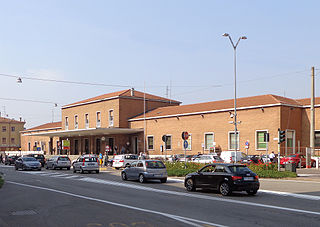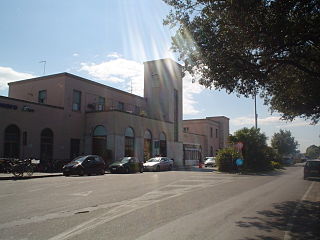
Bologna Centrale is the main railway station in Bologna, Italy. The station is situated at the northern edge of the city centre. It is located at the southern end of the Milan-Bologna high-speed line, which opened on 13 December 2008, and the northern end of three lines between Bologna and Florence: the original Bologna-Florence line through Porretta Terme and Pistoia; the Bologna–Florence Direttissima via Prato, which opened on 22 April 1934 and the Bologna-Florence high-speed line, which opened to traffic on 13 December 2009.

The Milan–Bologna high-speed railway is a railway line that links the cities of Milan and Bologna, part of the Italian high-speed rail network. It runs parallel to the historical north–south railway between Milan and Bologna, which itself follows the ancient Roman Road, the Via Aemilia. The new railway follows the Autostrada A1 closely for much of its length. The new line allows faster traffic to run separated and increase the overall railway capacity between the two cities.

The Milan–Bologna railway is the northern part of the traditional main north–south trunk line of the Italian railway network. It closely follows the ancient Roman Road, the Via Aemilia. The line was opened between 1859 and 1861 as a single-line railway, and was doubled between 1866 and 1894. It was electrified at 3,000 volts DC in 1938. High-speed trains on the route have used the parallel Milan–Bologna high-speed line since 13 December 2008.

Parma is a railway station serving the city of Parma, in the region of Emilia-Romagna, northern Italy. The station opened in 1859 and is located on the Milan–Bologna railway, Pontremolese railway, Brescia–Parma railway and Parma–Suzzara railway. The train services are operated by Trenitalia, Trenord and Ferrovie Emilia Romagna.

The Verona–Bologna railway is a major Italian railway connecting Verona and Bologna and part of the major axis from the Brenner railway to the Bologna–Florence and on to Rome. The line is part of the Line 1 of Trans-European Transport Networks (TEN-T). It is considered a "fundamental" line by the state railways Ferrovie dello Stato (FS).

Mantua Railway Station is the main station of Comune of Mantua in the Region of Lombardy, northern Italy.

Ancona railway station, sometimes called Ancona Centrale, is the main railway station of Ancona, Region of Marché. It is the most important station of the region and is owned by the Ferrovie dello Stato (FS), Italy's state-owned railway company.

Modena railway station is a railway station serving the city of Modena, in the region of Emilia-Romagna, northern Italy. The station opened in 1859 and is located on the Milan–Bologna railway, Verona–Modena railway and Modena–Sassuolo railway. The train services are operated by Trenitalia and Ferrovie Emilia Romagna.

Faenza railway station serves the city and comune of Faenza, in the region of Emilia-Romagna, northern Italy. Opened in 1893, it forms part of the Bologna–Ancona railway, and is also a terminus of two secondary railways, linking Faenza with Lavezzola and with Ravenna, and with Florence, respectively.

Ferrara railway station is the main station serving the city and comune of Ferrara, in the region of Emilia-Romagna, northern Italy. Opened in 1862, it forms part of the Padua–Bologna railway, and is also a terminus of three secondary railways, linking Ferrara with Ravenna and Rimini, Suzzara, and Codigoro, respectively.

Reggio Emilia is a railway station serving the city of Reggio Emilia, in the region of Emilia-Romagna, northern Italy. The station opened in 1859 and is located on the Milan–Bologna railway, Reggio Emilia–Ciano d'Enza railway, Reggio Emilia–Guastalla railway and Reggio Emilia–Sassuolo railway. The train services are operated by Trenitalia and Ferrovie Emilia Romagna.

Pesaro railway station serves the city and comune of Pesaro, in the region of Marche, central Italy. Opened in 1861, it forms part of the Bologna–Ancona railway.

The Bologna–Ancona railway is an Italian railway that connects the city of Bologna with the city of Ancona, passing through the Po Valley to Rimini and along the Adriatic coast for the rest of the line.
The following is a timeline of the history of the city of Rimini in the Emilia-Romagna region of Italy.
The Società anonima delle strade ferrate della Lombardia e dell'Italia Centrale was a joint-stock Anglo-French-Italian private company formed, following the partition of the territory, and the railways built in it, under construction or planned, resulting from the defeat of Austria in the Second Italian War of Independence, following the convention of 25 June 1860 among the Ministers of King Vittorio Emanuele II for Public Works and Finance and the previous Imperial-regia società privilegiata delle strade ferrate lombardo-venete e dell'Italia Centrale.
The Società Anonima per la Strada Ferrata dell'Italia Centrale was a railway company established in 1851 for the purpose of creating a railway link between Piacenza, Bologna and Tuscany. It later became part of the Milan - Bologna Railway.
Trasporto Passeggeri Emilia-Romagna is a public company overseeing public transportation in the Metropolitan City of Bologna, in the province of Ferrara and in parts of the provinces of Modena and Ravenna, Italy.

Trenitalia Tper (TTX) is a company operating train services in the Emilia-Romagna region, in Italy, on railway lines overseen by both Rete Ferroviaria Italiana and Ferrovie Emilia Romagna (FER).
Portomaggiore is a railway station in Portomaggiore, in the province of Ferrara, in the region of Emilia-Romagna, northern Italy. The station is on the Ferrara–Ravenna–Rimini railway and is the eastern terminus of the Bologna–Portomaggiore railway. The train services are operated by Trenitalia Tper.
















